Potassium is an essential mineral that plays a vital role in various bodily functions. It helps regulate blood pressure, muscle contractions, and nerve impulses, and aids in the proper functioning of the heart, kidneys, and other organs. However, many people do not consume enough potassium in their diets, which can lead to various health issues.
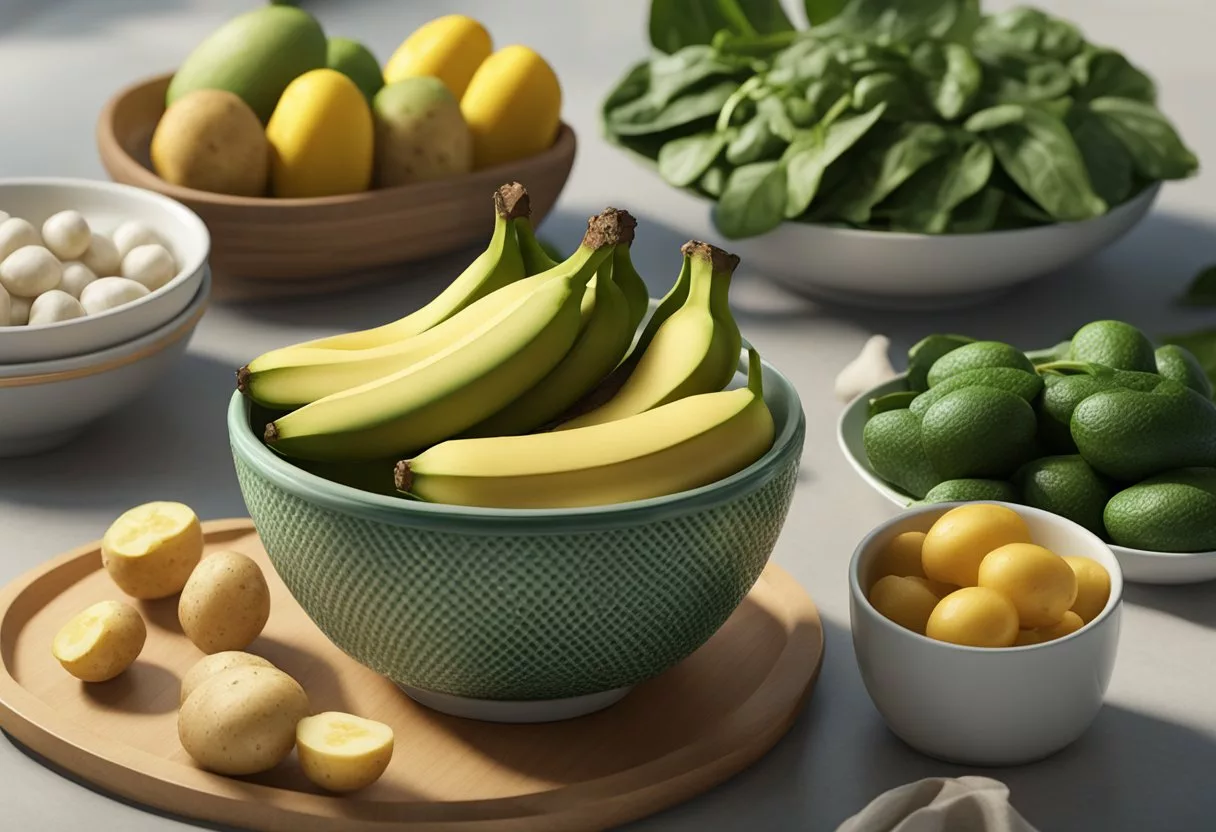
Understanding Potassium Potassium is a mineral that is found in many foods, particularly fruits and vegetables. It is an electrolyte, which means that it carries an electrical charge and helps conduct nerve impulses and muscle contractions. Potassium also helps regulate the balance of fluids in the body and plays a role in maintaining healthy blood pressure levels.
Sources of Potassium There are many foods that are high in potassium, including bananas, avocados, sweet potatoes, spinach, and coconut water. Other good sources of potassium include tomatoes, oranges, apricots, beans, peas, and lentils. Incorporating these foods into your diet can help ensure that you are getting enough potassium to support your body’s needs.
Key Takeaways
- Potassium is an essential mineral that plays a vital role in various bodily functions, including regulating blood pressure, muscle contractions, and nerve impulses.
- Many people do not consume enough potassium in their diets, which can lead to various health issues.
- Foods that are high in potassium include bananas, avocados, sweet potatoes, spinach, and coconut water.
Understanding Potassium
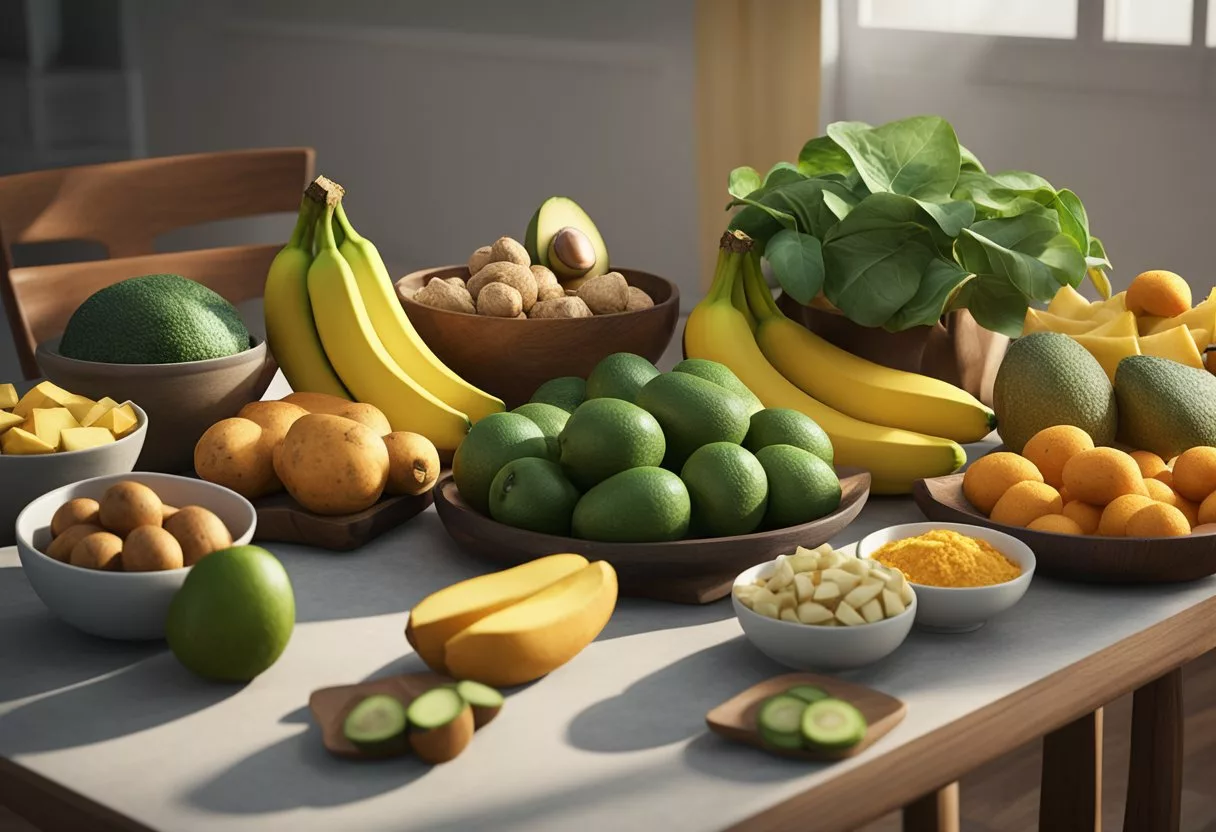
The Role of Potassium in the Body
Potassium is a mineral that plays a vital role in many bodily functions. It is an electrolyte that helps regulate fluid balance, muscle contractions, and nerve impulses. Potassium is also important for maintaining a healthy heart rhythm and blood pressure.
Potassium is primarily found inside cells, and the concentration of potassium inside and outside of cells is crucial for proper cell function. The concentration gradient helps regulate the movement of nutrients and waste products in and out of cells.
Recommended Daily Value for Adults
According to the National Institutes of Health, the recommended daily intake of potassium for adults is 2,600-3,400 milligrams per day. However, studies have shown that most adults do not consume enough potassium in their diets.
Increasing potassium intake can help lower blood pressure and reduce the risk of heart disease. Foods that are high in potassium include bananas, sweet potatoes, spinach, avocado, and white beans.
It is important to note that too much potassium can be harmful, especially for people with kidney disease. High levels of potassium in the blood can cause irregular heart rhythms and even cardiac arrest.
Overall, potassium is an essential mineral for maintaining proper bodily functions. It is important to consume a balanced diet that includes potassium-rich foods to ensure adequate intake.
Sources of Potassium
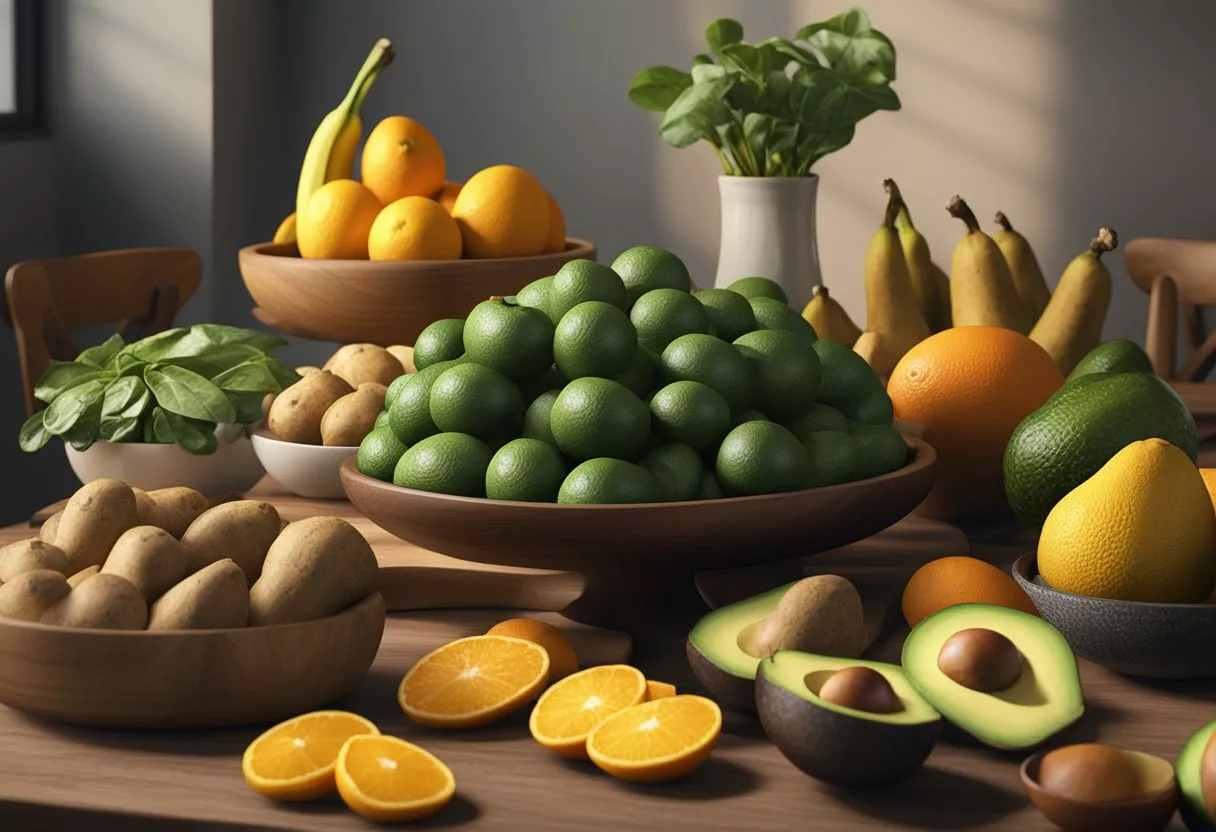
Potassium is an essential mineral that plays a crucial role in maintaining various bodily functions. Adequate potassium intake can help regulate blood pressure, support muscle and nerve function, and reduce the risk of kidney stones and osteoporosis. While bananas are often touted as the go-to potassium source, there are many other potassium-rich foods that can be incorporated into a healthy diet.
Potassium in Fruits
Fruits can be a great source of potassium. One medium-sized banana contains about 400-450mg of potassium. Other fruits high in potassium include oranges, cantaloupe, honeydew melon, and apricots. Tomatoes and tomato juice are also good sources of potassium.
Potassium in Vegetables
Vegetables are another excellent source of potassium. Potatoes (with skin), sweet potatoes, spinach, and beet greens are some of the vegetables with the highest potassium content. Other potassium-rich vegetables include broccoli, Brussels sprouts, and squash.
Potassium in Legumes and Nuts
Legumes and nuts are also great sources of potassium. Beans, including white beans, kidney beans, and lima beans, are high in potassium. Nuts such as almonds, pistachios, and cashews are also a good source of potassium.
Potassium in Fish and Meat
Fish and meat are not typically considered high in potassium, but some varieties can contribute to daily potassium intake. Salmon and tuna are good sources of potassium. Lean cuts of beef and pork are also good sources of potassium.
Potassium in Dairy and Alternatives
Dairy products are a good source of potassium. Milk and yogurt are high in potassium, with one cup of milk containing about 350-380mg of potassium. For those who are lactose intolerant or vegan, fortified soy milk and almond milk can also be good sources of potassium.
In conclusion, there are many potassium-rich foods that can be incorporated into a healthy diet. Eating a variety of fruits, vegetables, legumes, nuts, fish, and dairy products can help ensure adequate potassium intake.
High Potassium Foods for Specific Needs
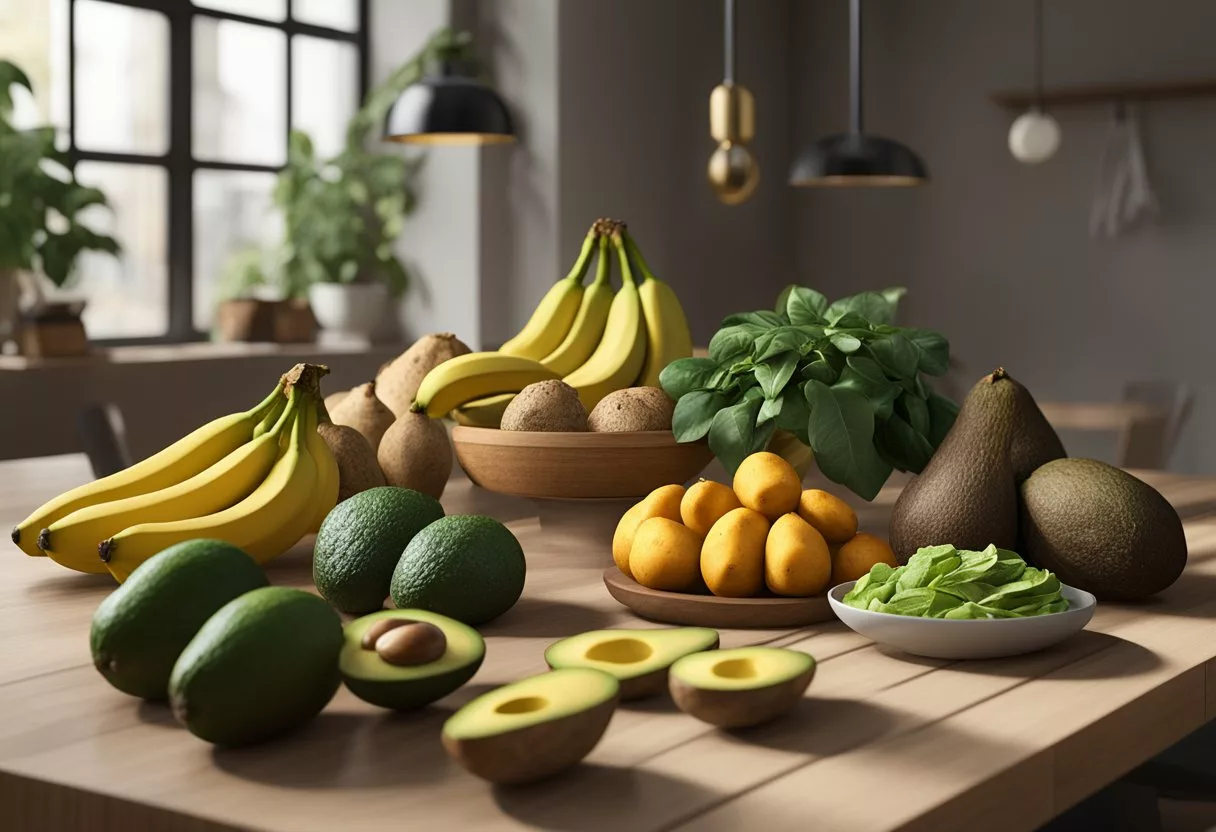
Potassium is an essential mineral that plays a crucial role in many bodily functions, including regulating blood pressure, maintaining heart health, and supporting kidney function. While many foods contain potassium, some are particularly beneficial for those with specific health needs.
Foods Beneficial for Blood Pressure Control
High blood pressure, also known as hypertension, is a common condition that affects many people worldwide. Consuming foods high in potassium can help lower blood pressure levels and reduce the risk of heart disease and stroke. Some of the best potassium-rich foods for blood pressure control include:
- Bananas: Bananas are a well-known source of potassium, with one medium banana containing around 400mg of potassium.
- Potatoes: Potatoes are an excellent source of potassium, with one medium-sized potato containing around 900mg of potassium.
- Tomatoes: Tomatoes are a great source of potassium, with one medium-sized tomato containing around 290mg of potassium.
- Sweet potatoes: Sweet potatoes are a good source of potassium, with one medium-sized sweet potato containing around 540mg of potassium.
- Beans: Beans are a good source of potassium, with one cup of cooked beans containing around 500-600mg of potassium.
Foods Beneficial for Heart Health
Potassium plays a crucial role in maintaining heart health, and consuming foods high in potassium can help reduce the risk of heart disease. Some of the best potassium-rich foods for heart health include:
- Avocado: Avocado is a great source of potassium, with one medium-sized avocado containing around 700mg of potassium.
- Spinach: Spinach is an excellent source of potassium, with one cup of cooked spinach containing around 840mg of potassium.
- Salmon: Salmon is a good source of potassium, with one 3-ounce serving of salmon containing around 350mg of potassium.
- Yogurt: Yogurt is a good source of potassium, with one cup of plain yogurt containing around 500mg of potassium.
- Dark chocolate: Dark chocolate is a good source of potassium, with one ounce of dark chocolate containing around 200mg of potassium.
Foods to Support Kidney Function
The kidneys play a vital role in removing waste products from the body, and consuming foods high in potassium can help support kidney function. However, those with kidney disease may need to limit their potassium intake. Some of the best potassium-rich foods to support kidney function include:
- Apples: Apples are a great source of potassium, with one medium-sized apple containing around 200mg of potassium.
- Cabbage: Cabbage is an excellent source of potassium, with one cup of cooked cabbage containing around 220mg of potassium.
- Cauliflower: Cauliflower is a good source of potassium, with one cup of cooked cauliflower containing around 280mg of potassium.
- Grapes: Grapes are a good source of potassium, with one cup of grapes containing around 290mg of potassium.
- Watermelon: Watermelon is a good source of potassium, with one cup of diced watermelon containing around 170mg of potassium.
Overall, consuming foods high in potassium can provide many health benefits, including regulating blood pressure, maintaining heart health, and supporting kidney function. By incorporating potassium-rich foods into their diet, individuals can improve their overall health and reduce the risk of chronic diseases.
Incorporating High Potassium Foods into Your Diet
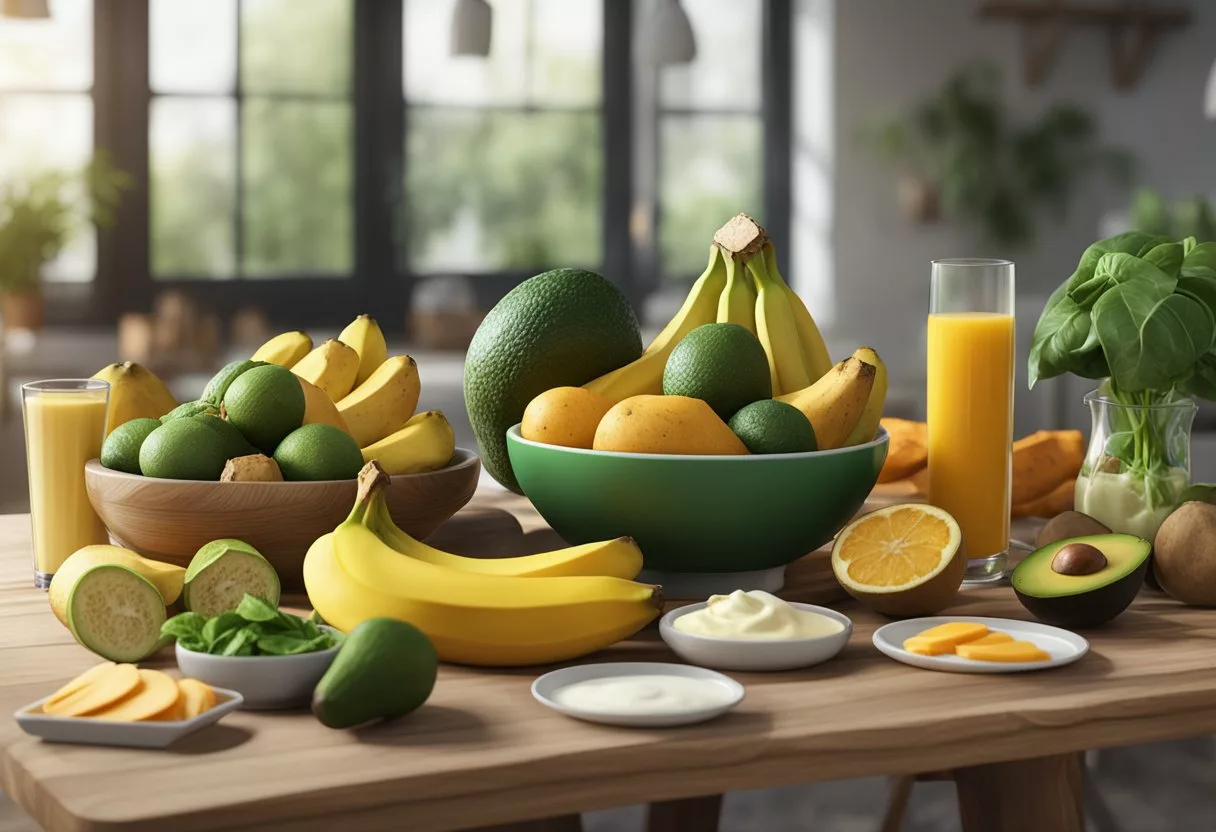
Potassium is an important mineral that is essential for the proper functioning of the body. Incorporating high potassium foods into your diet can help maintain a healthy balance of electrolytes and support various bodily functions. Here are some tips on how to incorporate high potassium foods into your diet.
Meal Planning with Potassium-Rich Foods
Meal planning is an effective way to incorporate high potassium foods into your diet. Start by identifying foods that are high in potassium, such as bananas, sweet potatoes, spinach, and avocados. Plan your meals around these foods, and aim to include at least one high potassium food in each meal.
To make meal planning easier, consider using a meal planning app or website. These tools can help you create a balanced meal plan that includes a variety of high potassium foods. You can also use a food tracking app to track your potassium intake and ensure that you are meeting your daily requirements.
Balancing Potassium with Other Nutrients
While it is important to incorporate high potassium foods into your diet, it is also important to balance your potassium intake with other nutrients. For example, consuming too much potassium can be harmful to individuals with kidney problems. Therefore, it is important to balance your potassium intake with other nutrients such as protein, fiber, vitamins, and minerals.
Calcium, magnesium, and sodium are important minerals that work together with potassium to maintain a healthy balance of electrolytes. Foods such as dairy products, nuts, seeds, and whole grains are good sources of these minerals. Incorporating these foods into your diet can help ensure that you are getting a balanced intake of essential nutrients.
In conclusion, incorporating high potassium foods into your diet is essential for maintaining a healthy balance of electrolytes and supporting various bodily functions. By meal planning with potassium-rich foods and balancing your potassium intake with other nutrients, you can ensure that you are getting the optimal amount of potassium for your body’s needs.
Potential Health Risks and Considerations
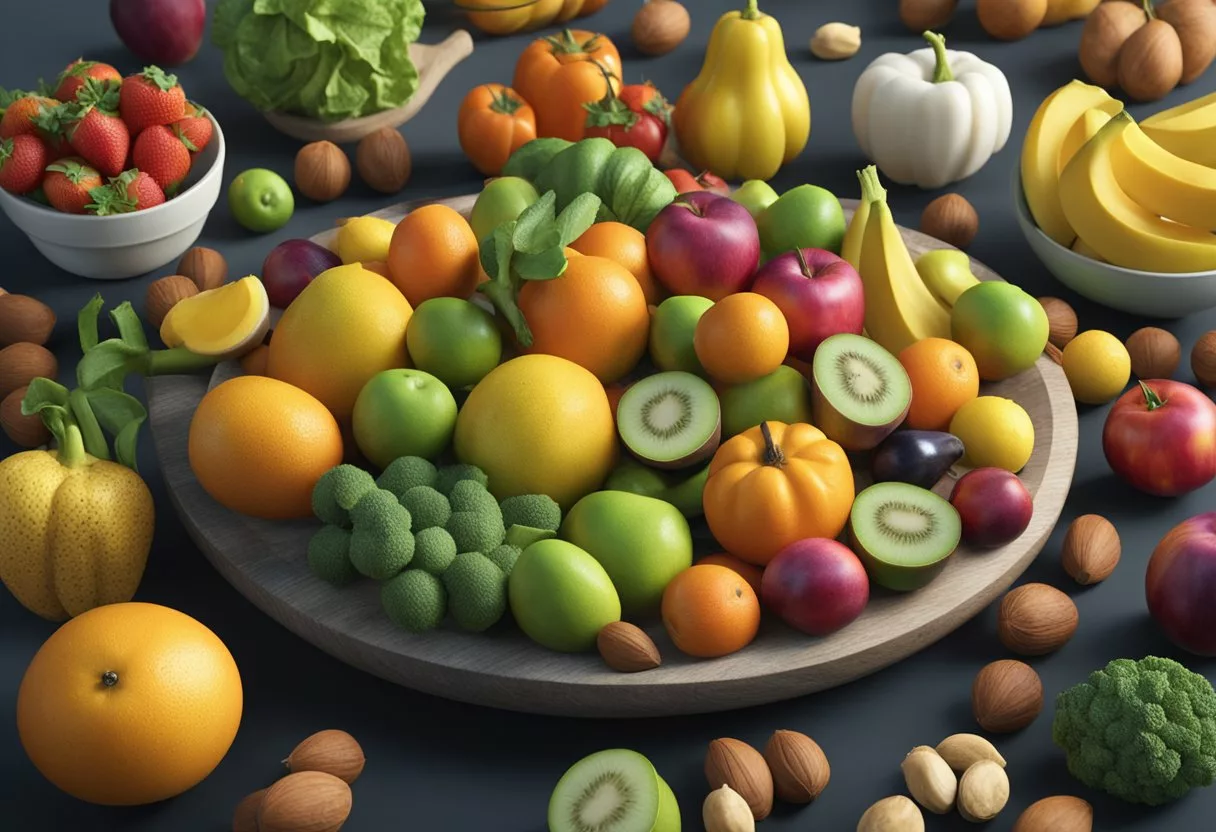
Hyperkalemia and Its Symptoms
Consuming too much potassium can lead to a condition called hyperkalemia, which is characterized by high levels of potassium in the blood. Symptoms of hyperkalemia include weakness, paralysis, and abnormal heart rhythms. Individuals with kidney disease are at a higher risk of developing hyperkalemia, as their kidneys may not be able to remove excess potassium from the body efficiently.
It is important to note that hyperkalemia is rare in healthy individuals who consume potassium from natural food sources. However, individuals with diabetes, high blood pressure, and kidney disease should speak with their healthcare provider before increasing their potassium intake, as they may be at a higher risk of developing hyperkalemia.
Interactions with Medications and Conditions
Consuming high levels of potassium can interact with certain medications and conditions. For example, some medications used to treat high blood pressure, such as ACE inhibitors and potassium-sparing diuretics, can cause potassium levels to increase in the blood. Individuals taking these medications should speak with their healthcare provider before increasing their potassium intake.
Additionally, individuals with kidney disease may need to limit their potassium intake, as their kidneys may not be able to remove excess potassium from the body. In some cases, healthcare providers may recommend that individuals with kidney disease avoid high-potassium foods altogether.
Overall, while potassium is an essential nutrient for the body, it is important to consume it in moderation and speak with a healthcare provider before making any significant changes to one’s diet.
Frequently Asked Questions
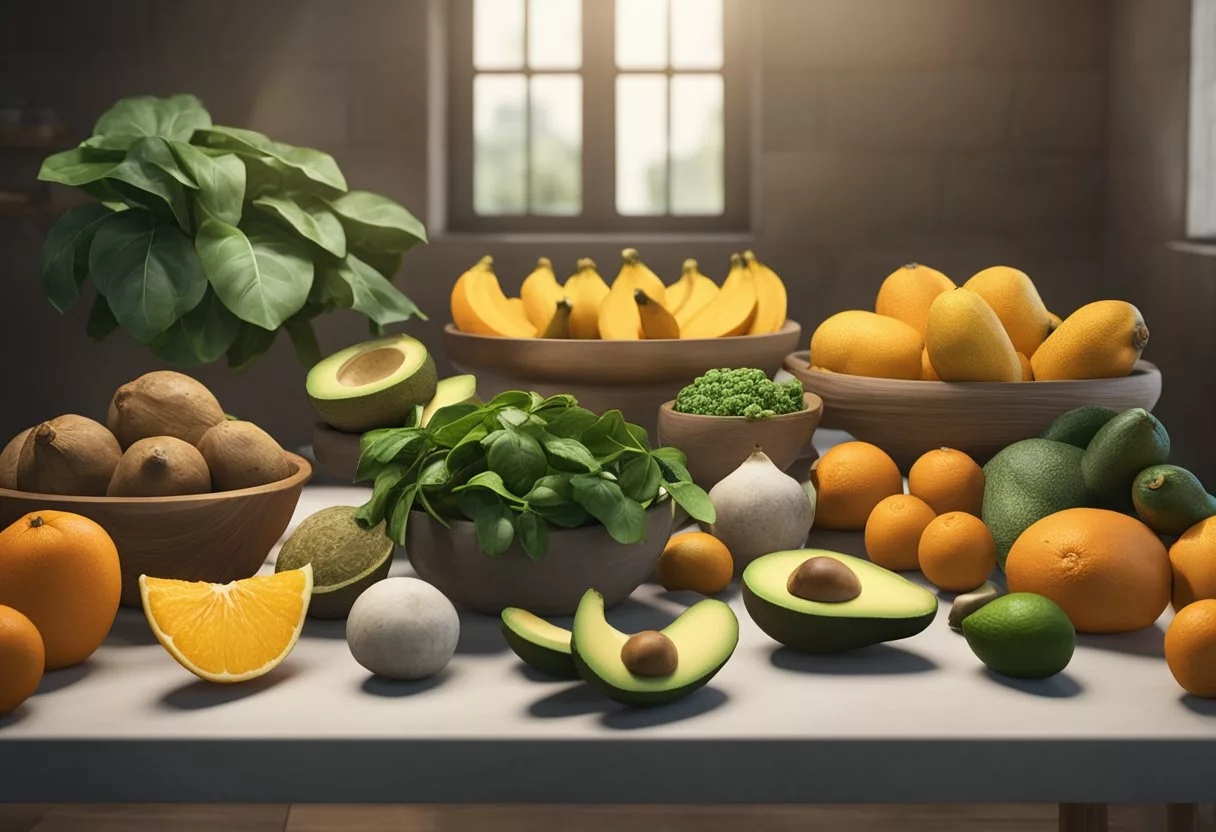
What are the top foods that can raise potassium levels quickly?
Some of the top foods that can raise potassium levels quickly include bananas, avocados, sweet potatoes, spinach, and salmon.
Which vegetables are considered high in potassium?
Vegetables that are considered high in potassium include sweet potatoes, spinach, tomatoes, mushrooms, and peas.
Can consuming milk contribute significantly to potassium intake?
Yes, consuming milk can contribute significantly to potassium intake. One cup of milk contains around 350mg of potassium.
What fruits should I include in my diet for a potassium boost?
Fruits that are high in potassium include bananas, oranges, kiwi, apricots, and cantaloupe.
Are there any meats or proteins that are particularly high in potassium?
Meats and proteins that are particularly high in potassium include fish, such as salmon and tuna, and lean cuts of beef and pork.
What are some common drinks that provide a high amount of potassium?
Some common drinks that provide a high amount of potassium include orange juice, tomato juice, and coconut water.